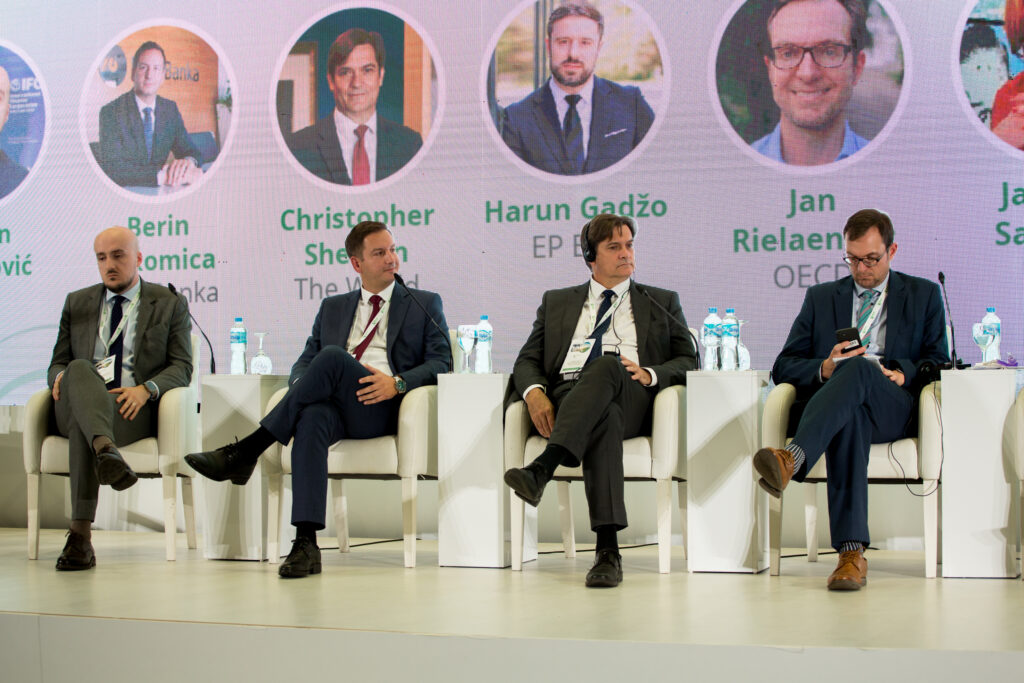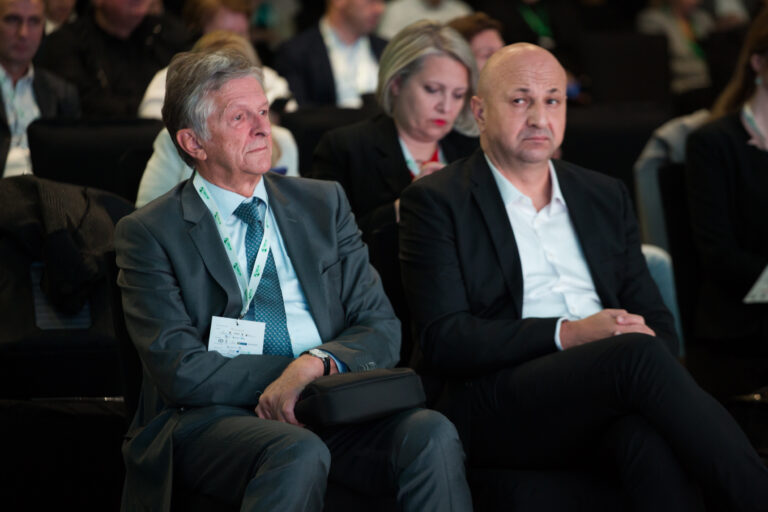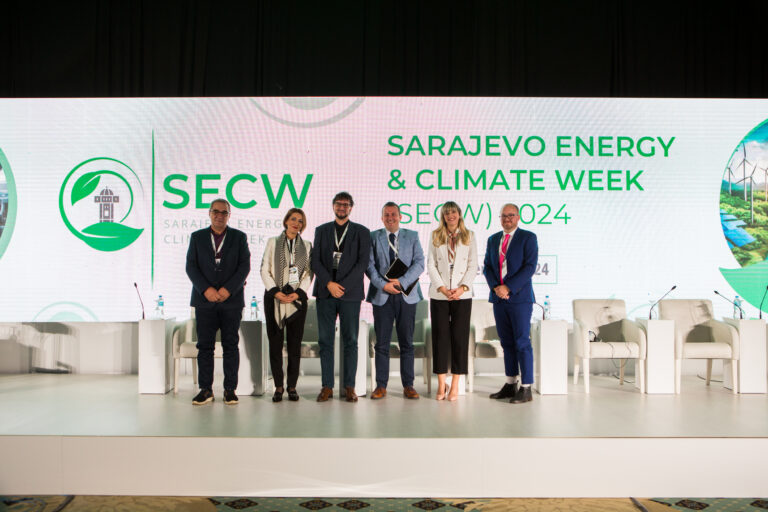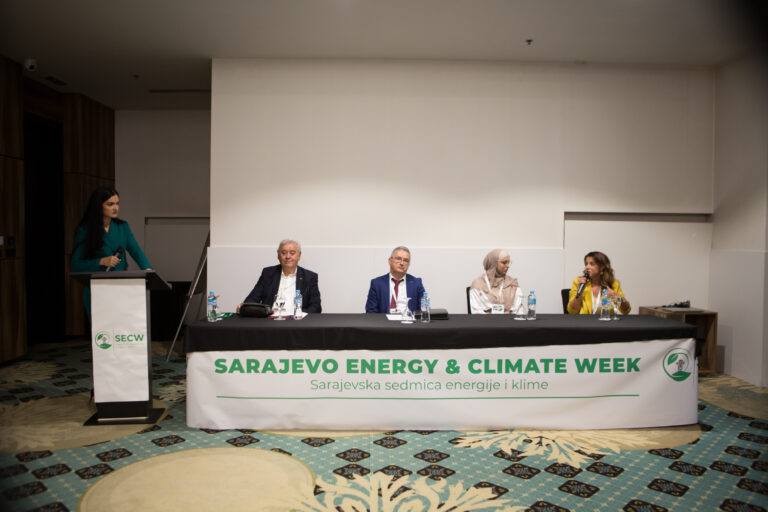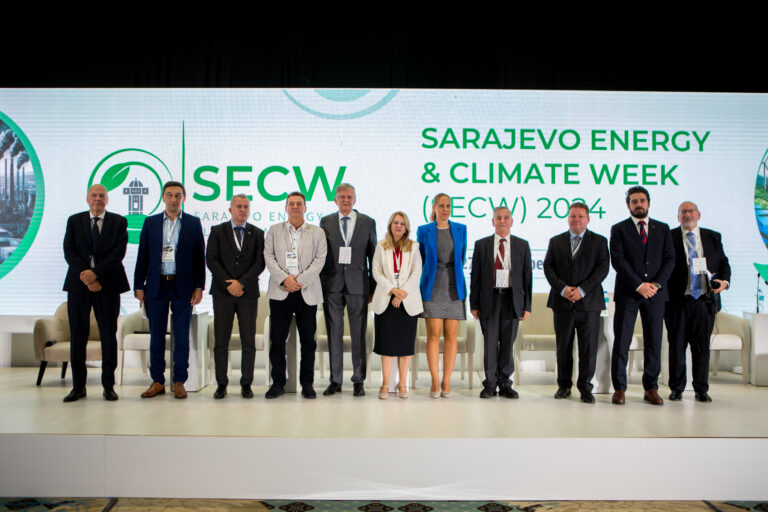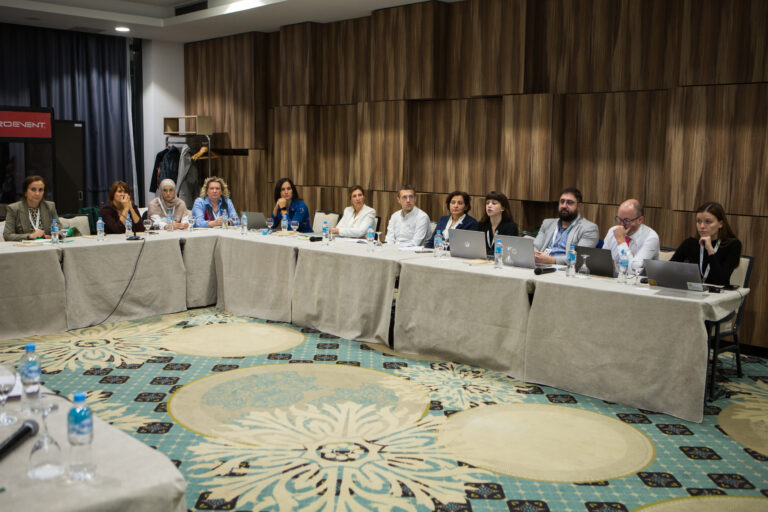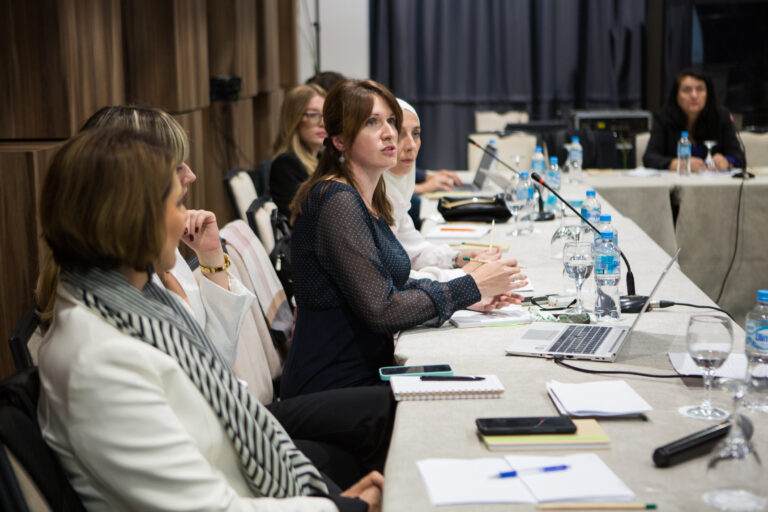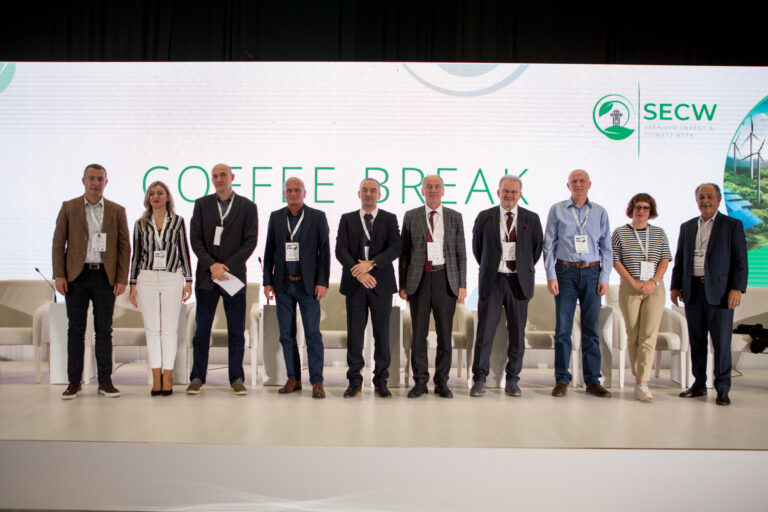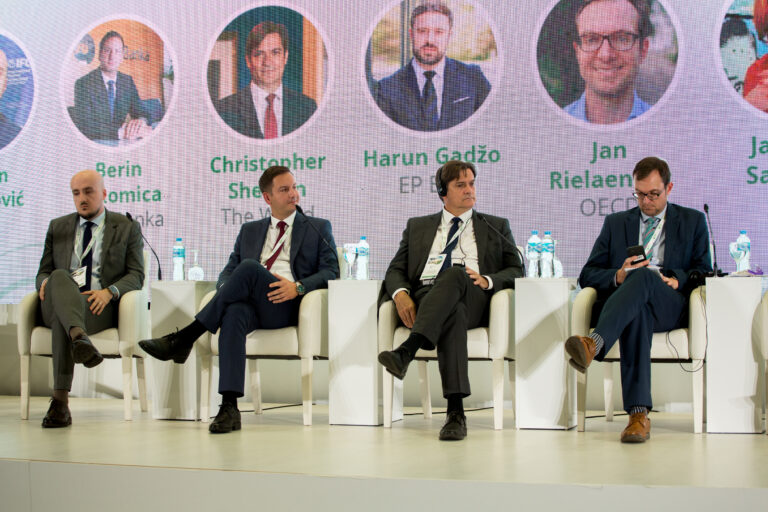Bulletin of the Day: Wednesday, September 25, 2024
The theme of the third day of SECW, and the last day at the Hills Hotel, was shaping the future of electric energy. This topic attracted significant interest from the participants of SECW. The day began with the ninth panel of this year’s Sarajevo Energy and Climate Week.
PANEL IX: ACHIEVING AMBITIOUS METHANE EMISSION REDUCTION GOALS
Panel IX was one of the key events of SECW dedicated to reducing emissions of this powerful greenhouse gas. Organized by CCAC and the Global Methane Pledge, it brought together experts from various sectors to discuss specific steps and strategies for achieving the ambitious goals of global agreements.
The panel moderator, Sanja Kapetina from the Ministry of Foreign Trade and Economic Relations of BiH and CCAC NPC, delivered an introductory presentation that set the stage for discussions on the challenges and opportunities related to methane emission reduction in the region. The panelists were:
- Tamara Bajkuša-Spahić, Ministry of Foreign Trade and Economic Relations of BiH, CCAC NFP
- Hamdija Mujezin, Consultant
- Timothy Jenkins, People in Need
- Siniša Ubiparipović, UNDP
- JP Elektroprivreda BiH dd Sarajevo
- Zajim Hrvat, Elektroprivreda BiH
This panel was significant because it highlighted opportunities for methane reduction, not just as an ecological step but also as an opportunity for economic advancement through the implementation of innovative technologies and international cooperation.
Conclusions of Panel IX:
Bosnia and Herzegovina, as a member of the Global Methane Pledge (GMP) and the Climate and Clean Air Coalition (CCAC), is actively involved in efforts to achieve methane emission reduction targets. The panel highlighted trends in methane emissions, as well as the positive environmental and socio-economic effects that methane reduction could bring to Bosnia and Herzegovina. Special attention was given to the importance of methane reduction for Bosnia and Herzegovina’s energy transition. It was concluded that it is necessary to establish a strategic basis for methane and to include the required policies in all key strategic documents of BiH.
PANEL X: ORGANIZING THE ELECTRICITY WHOLESALE MARKET WITH A FOCUS ON ESTABLISHING AN ELECTRICITY EXCHANGE IN BOSNIA AND HERZEGOVINA
On the third day of SECW, a panel was held focusing on organizing the electricity wholesale market, with special emphasis on establishing an electricity exchange in Bosnia and Herzegovina. The panel, organized within the EU4Energy program, provided an opportunity to discuss key challenges in integrating Bosnia and Herzegovina into regional and European energy markets and the necessary steps to ensure a more transparent and efficient energy trade in the future.
The panel was moderated by Ognjen Marković, an energy expert, who successfully led the discussion. The introductory presentations were delivered by Isidora Mičić, senior electricity market expert from NORD POOL, and Anže Predovnik, the general director of BSP SouthPool energy exchange. Their presentations provided insight into regional experiences with establishing energy markets and how such a system could be implemented in BiH.
PANEL XI: INTEGRATION OF RENEWABLE ENERGY SOURCES INTO THE ELECTRICAL ENERGY SYSTEM
Panel XI discussed the connection and integration of renewable energy sources into the electricity system, organized within the EU4Energy program. The aim of the panel was to discuss the challenges and opportunities posed by the expansion of renewable energy use and its integration into the existing energy infrastructure.
The discussion was moderated by Prof. Mustafa Musić from the Faculty of Electrical Engineering in Sarajevo, with the introductory presentation delivered by Muris Mešetović. The presentation provided an overview of current trends in renewable energy sources and the challenges of integrating them into electrical networks.
Conclusions of the Panel:
It was emphasized that the transmission and distribution network capacities need to be increased, especially in areas rich in renewable resources (wind, solar, hydropower), where the networks are underdeveloped. There was also discussion on the need for significant balancing capacity in the system when large-scale intermittent renewable sources (wind and solar) are included. Hydropower plants, gas plants for balancing, and battery capacities were considered a priority for balancing.
PANEL XII: FINANCING A FAIR ENERGY TRANSITION, TRENDS, AND CHALLENGES
This panel focused on financing a fair energy transition, with an emphasis on global trends and challenges. The organizer of the panel was the European Investment Bank (EIB), and the discussion addressed key issues related to mobilizing financial resources for a sustainable and inclusive transition to clean energy sources.
The panel was moderated by Branko Čevriz from EIB, who also delivered the introductory presentation, which provided an overview of the current state of the energy sector, with special emphasis on the need for financing the transition to ensure social fairness and environmental sustainability.
PANEL XIII: CORPORATE POWER PURCHASE AGREEMENTS (PPA): FROM THEORY TO PRACTICE IN THE EU AND THE WESTERN BALKANS
Panel XIII on the third day of SECW was dedicated to corporate Power Purchase Agreements (PPA) and their implementation in the EU and the Western Balkans. The panel was organized by the Energy Community, and the discussion was moderated by Naida Taso from the Energy Community Secretariat. The introductory presentation clarified key aspects of PPA agreements, highlighting their importance for energy transition and supply security.
Panelists shared their experiences and best practices from various countries.
Conclusion of the Panel:
PPAs are a key tool for strengthening renewable energy markets and attracting investments, but they have not yet been widely implemented in the Western Balkans. Key factors for establishing a framework to enable the application of these agreements include the creation of day-ahead and intraday markets, coupling with the EU’s single market, an established balancing system, a proper legal and regulatory framework, increased corporate sector interest, efficient and transparent licensing procedures, and a system for issuing guarantees of origin.
SIDE EVENT VIII: ESG OPPORTUNITIES IN THE ENERGY TRANSITION
This side event was organized by the Chamber of Commerce of BiH and the independent BiH consulting firm nLogic Advisory. It was moderated by Sendžana Muslić from the Chamber of Commerce of FBiH, with participation from ESG experts:
- Almir Bajtarević, Cementara Kakanj
- Esmina Šahić, nLogic Advisory
- Ines Amitović, Procredit Bank
- Nedin Pinjo, Inesa Sanpalo Bank
- Mladen Rudež, Consultant
- Sanja Miovčić, Foreign Investors Council
SIDE EVENT IX: CCAC KICK-OFF MEETING
This meeting, held as part of SECW, was an introductory event for the Climate and Clean Air Coalition (CCAC) initiative. Sanja Kapetina and Tamara Bajkuša-Spahić from the Ministry of Foreign Trade and Economic Relations of BiH moderated the meeting, laying the groundwork for future CCAC activities.
The goal of the meeting was to establish a dialogue between key stakeholders on methane emissions reduction and other air pollutants in the region and to promote concrete steps in the fight against climate change. Participants discussed strategies to help achieve ambitious emission reduction goals in line with the Global Methane Pledge.
With the conclusion of the last panel, the third day of the Sarajevo Energy and Climate Week came to an end, marking the final day held at the Hills Hotel. Participants were invited to attend the fourth day of SECW at Energoinvest, one of the partners of this year’s SECW.
Day 4 will be dedicated to the energy sector pioneer of the region, the esteemed Emerik Blum.
